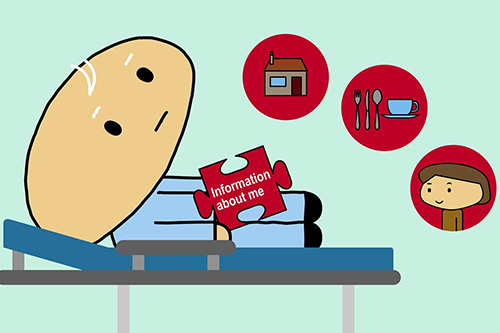A new campaign to support older people with frailty admitted to hospital in an emergency has launched today. Many people worry about the possibility of an emergency hospital admission, and the coronavirus pandemic will be heightening these concerns. The ‘Information About Me’ campaign helps older patients – or their relatives or carers – give the right information about their usual day-to-day life to staff to help patients leave hospital at the right time.
The campaign is based on research led by the National Institute for Health Research Applied Research Collaboration West (NIHR ARC West) researchers at the University of Bristol, in collaboration with lead clinicians from North Bristol NHS Trust and University Hospitals Birmingham NHS Trusts, which aims to understand what causes delays in discharging frail and elderly patients from hospital.
These delays cost the NHS around £820 million a year and can be upsetting for patients and their families. For many older patients, the longer that they stay in hospital, the greater the risk that their strength and independence will diminish.
When planning for a patient to leave hospital safely, different pieces of information about the patient need to be brought together. If any information is missing, it can be more difficult to decide what support the patient will need, and this may delay them leaving hospital.
By examining in detail what happens on the wards of the two participating NHS Trusts, our researchers aim to improve the process of discharging frail and elderly patients from these hospitals, and in hospitals across the UK. They are now working with the health system to begin to implement the findings.
Based on their research, and working alongside public contributors, researchers have created an Information About Me video animation and a sample Information About Me form to complete and provide to hospital staff on arrival.
https://www.youtube.com/embed/nhOFWX5sQP0 ‘Information About Me’ encourages patients, or their relatives or carers, to collect information about the patient’s day-to-day life – where they live, how they look after themselves, and who supports or cares for them – and to make hospital staff aware of this information when patients are admitted. Recording all the relevant information in one place means that this information is more accessible to staff, and delays can be avoided.
People who are older and frail are more likely to struggle after even a minor illness or a change in medication or environment. Public contributor Sarah Biggs volunteered to be part of the study team because her late mother had endured a lengthy hospital stay following a fall.
Sarah said: “Staff need to understand what the person’s baseline was before they went into hospital. If they can walk and talk and dance and listen to music and be independent, then they need to know that. But if they can’t do any of those things, and this is how they currently function and this is the help that they get, then that needs to be understood too. With my mother, I never had the chance to set this out.”
Read more about Sarah’s experience of her late mother’s hospital stay.
Dr Kyra Neubauer, Consultant Physician at North Bristol NHS Trust, added: “Although geriatricians have long recognised the importance of ‘information about me’ this research confirmed that such information needs to be collected as early as possible and recorded in a way that makes it easily accessible to all staff. If patients, relatives and carers understand the value of this information, they can help hospital staff to facilitate safe, appropriate and speedier discharges for themselves or their loved ones.”
Dr Sabi Redwood, Senior Lecturer in Ethnography / Qualitative Social Science in Bristol Medical School: Population Health Sciences (PHS), Deputy Director of NIHR ARC West and the study’s principal investigator, explained: “Our study found that information about an older person’s day-to-day life was really important to help staff in hospital and in the community to make good decisions and plan for their discharge. This information is about knowing how independent an older person is, what they can do for themselves and what they need help with, who pops in to see and support them, and what is important to them.
“This vital information was often not recorded consistently or stored in a way that everyone involved in their care could see. That meant that patients and family members were often asked the same questions which can be frustrating. Having the information in one place for all involved helped the planning and co-ordinating of care.”
Further information
Find out more about the Information About Me campaign at: arc-w.nihr.ac.uk/information-about-me
About the National Institute for Health Research
The National Institute for Health Research (NIHR) is the nation’s largest funder of health and care research. The NIHR:
- Funds, supports and delivers high quality research that benefits the NHS, public health and social care
- Engages and involves patients, carers and the public in order to improve the reach, quality and impact of research
- Attracts, trains and supports the best researchers to tackle the complex health and care challenges of the future
- Invests in world-class infrastructure and a skilled delivery workforce to translate discoveries into improved treatments and services
- Partners with other public funders, charities and industry to maximise the value of research to patients and the economy
The NIHR was established in 2006 to improve the health and wealth of the nation through research, and is funded by the Department of Health and Social Care. In addition to its national role, the NIHR supports applied health research for the direct and primary benefit of people in low- and middle-income countries, using UK aid from the UK government.
This work uses data provided by patients and collected by the NHS as part of their care and support and would not have been possible without access to this data. The NIHR recognises and values the role of patient data, securely accessed and stored, both in underpinning and leading to improvements in research and care.
About the NIHR Applied Research Collaboration West
The NIHR Applied Research Collaboration West (ARC West) conducts applied health research with its partners and others in the health and care sector, alongside patients and members of the public. Applied health research aims to address the immediate issues facing the health and social care system. ARC West also helps bring research evidence into practice and provides training for the local workforce.

